-
ORIGINAL ARTICLE12-13-2024
Nurses’ experience regarding patient safety in mobile pre-hospital care
Revista Brasileira de Enfermagem. 2024;77(5):e20230529
Abstract
ORIGINAL ARTICLENurses’ experience regarding patient safety in mobile pre-hospital care
Revista Brasileira de Enfermagem. 2024;77(5):e20230529
DOI 10.1590/0034-7167-2023-0529
Views0See moreABSTRACT
Objectives:
to understand nurses’ experience regarding patient safety in mobile pre-hospital care.
Method:
a qualitative, exploratory and descriptive study, conducted with nurses active in mobile pre-hospital care services. Semi-structured interviews were conducted, audio-graved and submitted to Bardin’s content analysis.
Results:
from four thematic categories established, nurses reported the care and management skills necessary to work in this service. They demonstrated a commitment to ensuring safe care for patients, staff and spectators. They highlighted the actions taken to prevent and mitigate incidents. However, they based their experiences on practice protocols and individual actions, expressing the need to improve knowledge about patient safety.
Final Considerations:
mobile pre-hospital care nurses’ experience in relation to patient safety was limited, suggesting the need for training on the subject, alignment of work processes and implementation of strategies, aiming to guarantee safe care.
-
ORIGINAL ARTICLE12-13-2024
Repercussions of the pandemic on tuberculosis control actions from the perspective of health professionals
Revista Brasileira de Enfermagem. 2024;77(5):e20230477
Abstract
ORIGINAL ARTICLERepercussions of the pandemic on tuberculosis control actions from the perspective of health professionals
Revista Brasileira de Enfermagem. 2024;77(5):e20230477
DOI 10.1590/0034-7167-2023-0477
Views0See moreABSTRACT
Objectives:
to analyze the repercussions of the COVID-19 pandemic on tuberculosis control actions from the perspective of primary health care professionals.
Methods:
this descriptive study with a qualitative approach was conducted from November 2022 to April 2023, using semi-structured interviews with 11 key informant professionals from primary health care units in a Brazilian capital. Data were organized using Atlas.ti 22.0 software and subjected to thematic-categorical content analysis.
Results:
the pandemic scenario caused alterations in the work process, necessitating abrupt adaptations, and led to detrimental impacts on the health of professionals and tuberculosis control actions, which were reduced or discontinued.
Final Considerations:
there was evident unpreparedness and a lack of resources from various governmental levels and health services to handle the public health emergency situation without severe harm to the provision of essential services.
-
12-13-2024
Training of Brazilian indigenous nurses: between human rights, valuing diversity and inclusion
Revista Brasileira de Enfermagem. 2024;77(5):e20230430
Abstract
Training of Brazilian indigenous nurses: between human rights, valuing diversity and inclusion
Revista Brasileira de Enfermagem. 2024;77(5):e20230430
DOI 10.1590/0034-7167-2023-0430
Views0See moreABSTRACT
Objectives:
to analyze the possibilities and potential of training indigenous nurses, given the Brazilian Health System (SUS), understanding the relationships between education and health.
Methods:
theoretical-reflective study, based on scientific literature, aligned with the experience, critical thinking of its authors and the Sustainable Development Goals in Brazil.
Results:
this text articulates three axes: Potential for including indigenous students in nursing training; Paths to achieving equity through inclusion and retention policies for indigenous students at different levels; and Implications of this for the SUS and global health.
Final Considerations:
indigenous students, beneficiaries of affirmative actions, face challenges of inclusion and retention in public universities that directly impact their academic training. Added to this are the difficulties identified in basic education, professor training and implementation of permanence policies, with consequences for services and training at other levels.
-
ORIGINAL ARTICLE12-13-2024
Interobserver agreement in Reception and Risk Stratification in Obstetrics implementation
Revista Brasileira de Enfermagem. 2024;77(5):e20230361
Abstract
ORIGINAL ARTICLEInterobserver agreement in Reception and Risk Stratification in Obstetrics implementation
Revista Brasileira de Enfermagem. 2024;77(5):e20230361
DOI 10.1590/0034-7167-2023-0361
Views0See moreABSTRACT
Objectives:
to analyze interobserver agreement in the Reception and Risk Stratification in Obstetrics protocol implementation.
Methods:
a cross-sectional study carried out during Reception and Risk Stratification in Obstetrics implementation, conducted in a tertiary hospital in southern Brazil with 891 participants in January 2020. Descriptive and interobserver agreement analysis was carried out using the Kappa coefficient in the risk stratification assigned by the triage nurse and reviewed by the researcher.
Results:
around half of the calls (55.6%) were stratified as not very urgent (green), followed by urgent (yellow) (31.8%), very urgent (orange) (9.3%), not urgent (blue) (3.4%) and no emerging stratification (red). Agreement analysis of revised stratification found Kappa values of 0.20 (blue), 0.54 (green), 0.77 (yellow) and 0.80 (orange).
Conclusions:
most appointments were non-urgent. The agreement analysis between the revised and assigned risk stratification revealed greater interobserver agreement as the priority level increased.
-
ORIGINAL ARTICLE12-13-2024
Adaptation and implementation of a Nursing care protocol for children in the Amazon Region
Revista Brasileira de Enfermagem. 2024;77(5):e20230245
Abstract
ORIGINAL ARTICLEAdaptation and implementation of a Nursing care protocol for children in the Amazon Region
Revista Brasileira de Enfermagem. 2024;77(5):e20230245
DOI 10.1590/0034-7167-2023-0245
Views0See moreABSTRACT
Objectives:
to describe the process of implementing an adapted protocol for pediatric nursing care in a health unit located in a municipality in the Amazon Region.
Methods:
methodological research conducted in a basic health unit with four family health teams in the state of Rondônia, involving seven nursing professionals. Data collection occurred between October 2020 and April 2022, following the research phases: situational diagnosis, exploratory phase, protocol definition, implementation, and evaluation.
Results:
the outcome was the adaptation and implementation of a nursing care protocol for children.
Final Considerations:
the adaptation and implementation process can be an effective approach to improving care, strengthening nursing as a profession with a solid foundation in scientific and clinical evidence. This facilitates early problem identification and appropriate guidance, leading to better health outcomes for children.
-
ORIGINAL ARTICLE12-13-2024
Nurses’ experiences in caring for people with mental health problems hospitalized due to clinical comorbidities
Revista Brasileira de Enfermagem. 2024;77(5):e20230136
Abstract
ORIGINAL ARTICLENurses’ experiences in caring for people with mental health problems hospitalized due to clinical comorbidities
Revista Brasileira de Enfermagem. 2024;77(5):e20230136
DOI 10.1590/0034-7167-2023-0136
Views0See moreABSTRACT
Objectives:
to understand nurses’ experiences in caring for people with mental health problems hospitalized due to clinical comorbidities in non-psychiatric Inpatient Units.
Methods:
qualitative study, guided by Alfred Schutz’s social phenomenology. Sixteen phenomenological interviews were conducted. The content was analyzed and discussed based on the literature, through the composition of three categories of analysis.
Results:
three categories emerged in the study: Challenges in care faced by nurses; Fragmented care action; and Ideal care. The disarticulation of the clinic was revealed, as described by nurses, showing care as an action far removed from the comprehensiveness of a person. Nurses’ performance is guided predominantly by biomedical reference, disregarding appreciation of subjectivity.
Final Considerations:
it was observed that nurses attribute the responsibility for patient care to factors external to their life-world, when, in fact, these aspects should be components that help them in comprehensive care construction.
-
REVIEW11-29-2024
Assessment of knowledge in oncology about care for transgender people: a scoping review
Revista Brasileira de Enfermagem. 2024;77:e20230532
Abstract
REVIEWAssessment of knowledge in oncology about care for transgender people: a scoping review
Revista Brasileira de Enfermagem. 2024;77:e20230532
DOI 10.1590/0034-7167-2023-0532
Views0See moreABSTRACT
Objective:
to identify evidence available in the literature on instruments and methodologies used to assess healthcare professionals’ knowledge about cancer care for the transgender population.
Methods:
a scoping review was conducted in seven databases, including studies that answered the question: what is the healthcare professionals’ level of knowledge about cancer care for the transgender population?
Results:
forty-one articles were selected that dealt specifically with healthcare professionals’knowledge in relation to care for the LGBTQIAPN+ population, especially the transgender population. Eighteen studies assessed patients’ perceptions of professionals’knowledge, whereas other studies used their own assessment tools, considering the global context of LGBTQIAPN+ health.
Conclusions:
there is no tested and validated instrument that assesses the knowledge about the transgender population’s oncological health, highlighting the need to construct and validate an instrument focused on this population’s needs.

-
ORIGINAL ARTICLE11-29-2024
Sleep quality of vulnerable elderly people: associated factors
Revista Brasileira de Enfermagem. 2024;77:e20230283
Abstract
ORIGINAL ARTICLESleep quality of vulnerable elderly people: associated factors
Revista Brasileira de Enfermagem. 2024;77:e20230283
DOI 10.1590/0034-7167-2023-0283
Views0See moreABSTRACT
Objective:
To identify factors associated with poor sleep quality in elderly dependent individuals in social vulnerability.
Method:
Cross-sectional study with 59 elderly dependent individuals assisted by Family Health Units in São Carlos/SP. The following tools were used: Katz Index, Lawton and Brody Scale, Pittsburgh Sleep Quality Index, Addenbrooke’s Cognitive Examination Revised, Fried’s Frailty Phenotype, Geriatric Depression Scale (15 items), Perceived Stress Scale, Family APGAR, Social Support Scale from the Medical Outcomes Study, and World Health Organization Quality of Life, abbreviated and “old” versions.
Results:
The majority of participants were women (52.5%), aged 60-74 years (71.1%), and had poor sleep quality (76.2%). Stress (OR=1.12; 95%CI=1.02-1.22) and polypharmacy (OR=7.39; 95%CI=1.22-44.73) increased the chances of poor sleep quality, while physical activity decreased these chances (OR=0.15; 95%CI=0.02-0.79).
Conclusion:
Stress and polypharmacy are associated with poor sleep quality in elderly dependent individuals.
-
REVIEW11-27-2023
Educational interventions for cervical cancer prevention: a scoping review
Revista Brasileira de Enfermagem. 2023;76(5):e20230018
Abstract
REVIEWEducational interventions for cervical cancer prevention: a scoping review
Revista Brasileira de Enfermagem. 2023;76(5):e20230018
DOI 10.1590/0034-7167-2023-0018
Views0See moreABSTRACT
Objectives:
to identify, map and describe characteristics of educational interventions for cervical cancer prevention in adult women.
Methods:
a scoping review conducted on eleven databases and the gray literature, including studies that described educational interventions aimed at preventing cervical cancer in adult women.
Results:
thirty-three articles with 151,457 participants were analyzed. The most used educational strategies were participatory discussions and educational leaflets. Most of the interventions took place in a single session, ranging from 40 to 60 minutes. The most used theoretical model in interventions to improve women’s compliance with Pap smear was the Health Belief Model.
Conclusions:
group discussions, lectures and educational brochures can increase knowledge and reduce barriers to cervical cancer prevention. Theory-based and culturally sensitive interventions can have a positive impact on women’s health.
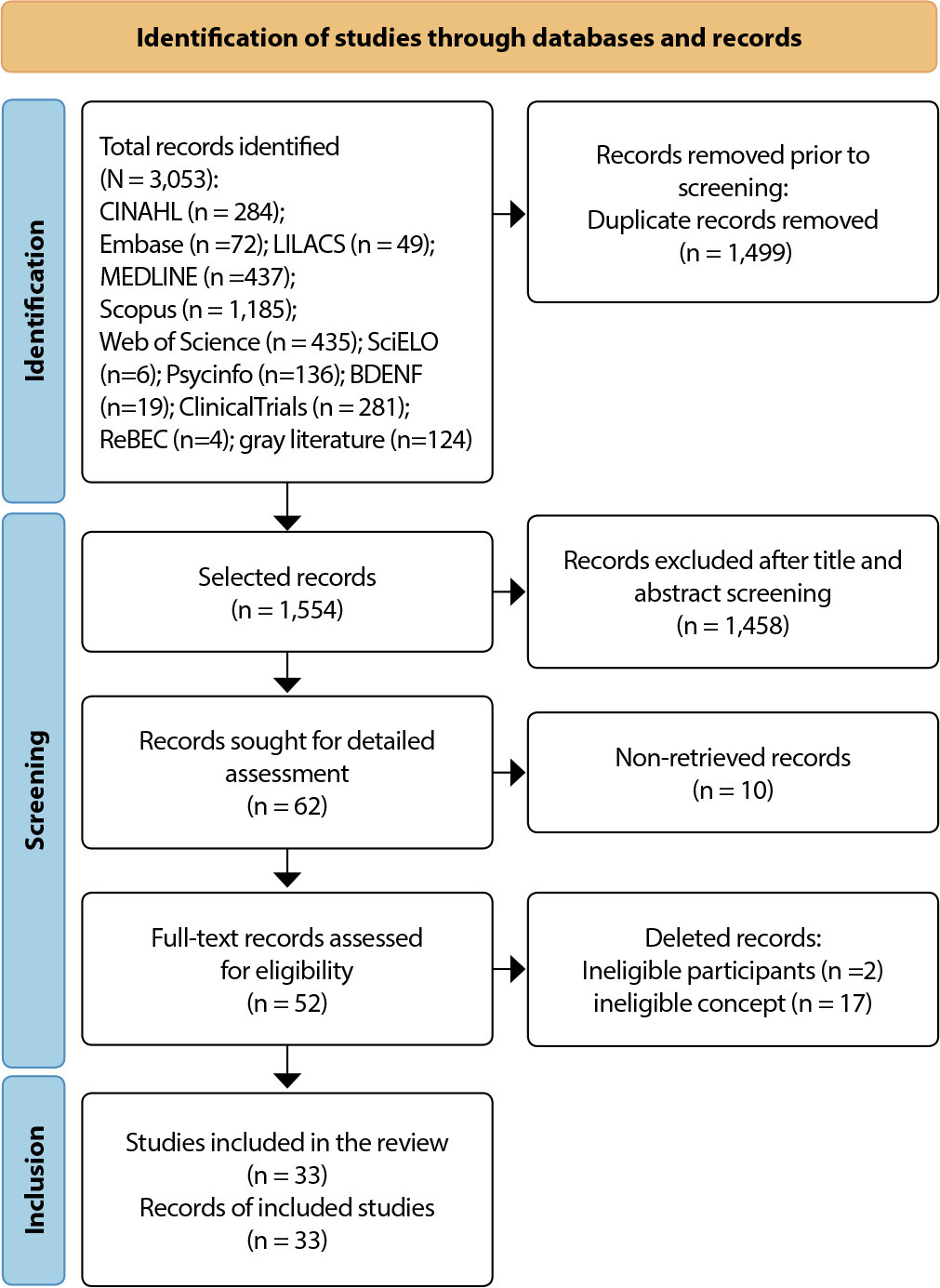
-
ORIGINAL ARTICLE11-27-2023
Validation of the hospital resources assessment scale for the preservation of urinary continence in the elderly
Revista Brasileira de Enfermagem. 2023;76(5):e20220805
Abstract
ORIGINAL ARTICLEValidation of the hospital resources assessment scale for the preservation of urinary continence in the elderly
Revista Brasileira de Enfermagem. 2023;76(5):e20220805
DOI 10.1590/0034-7167-2022-0805
Views0See moreABSTRACT
Objectives:
to validate the internal structure of the Hospital Resources Assessment Scale for the Preservation of Urinary Continence in the Elderly.
Methods:
validation study of the internal structure of a scale constructed based on the Donabedian conceptual model and an integrative review, with prior content validation. The scale was applied to the target population, and 124 nurses responded to the questionnaire. Exploratory Factor Analysis was performed using the FACTOR software, employing multiple techniques.
Results:
a factorial model with 11 items organized into two dimensions (support for human resources and material resources) was obtained. The “physical structure” dimension was removed from the initial model and adopted as a complementary checklist to the instrument, as it was not possible to obtain a factorable model with this dimension.
Conclusions:
we provide a valid scale that can measure indicators, identifying weaknesses and/or strengths related to hospital resources for the preservation of urinary continence in the elderly.

-
11-27-2023
Implementación de estrategia de enfermería para autotrascendencia en adulto mayor: relato de experiencia
Revista Brasileira de Enfermagem. 2023;76(5):e20220745
Abstract
Implementación de estrategia de enfermería para autotrascendencia en adulto mayor: relato de experiencia
Revista Brasileira de Enfermagem. 2023;76(5):e20220745
DOI 10.1590/0034-7167-2022-0745es
Views0See moreRESUMEN
Objetivos:
relatar la experiencia de la implementación de una estrategia de enfermería para promover la autotrascendencia en adultos mayores que acuden a un centro de primer nivel de atención en salud.
Métodos:
relato de experiencia sobre implementación de una estrategia abordando la Teoría de Autotrascendencia por enfermería a adultos mayores de una unidad de salud de primer nivel, en San Luis Potosí, México, de octubre-noviembre del 2022.
Resultados:
participaron 14 adultos mayores y tres enfermeros. A partir de la expresión de sentimientos, charlas sobre autotrascendencia, fomento de espiritualidad y actividad física, la estrategia resultó satisfactoria. Se observaron cambios emocionales, cognitivos y espirituales en las diferentes dimensiones de la Teoría de Autotrascendencia.
Consideraciones Finales:
la estrategia de enfermería sobre autotrascendencia permitió plasmar momentos significativos que ayudaron a identificar puntos clave en los que se encontraban los adultos mayores; esto ayudó para intervenir desde una perspectiva del cuidado de persona a persona.
-
EXPERIENCE REPORT11-27-2023
Implementation of a nursing strategy for self-transcendence in older adults: an experience report
Revista Brasileira de Enfermagem. 2023;76(5):e20220745
Abstract
EXPERIENCE REPORTImplementation of a nursing strategy for self-transcendence in older adults: an experience report
Revista Brasileira de Enfermagem. 2023;76(5):e20220745
DOI 10.1590/0034-7167-2022-0745
Views0See moreABSTRACT
Objectives:
to report the experience of implementing a nursing strategy to promote self-transcendence in older adults attended at a Primary Health Care center.
Methods:
an experience report on the implementation of a strategy addressing the Theory of Self-Transcendence by nursing to older adults in a primary health unit, in San Luis Potosí, Mexico, from October to November 2022.
Results:
fourteen older adults and three nurses participated. From the expression of feelings, speeches about self-transcendence, spirituality and physical activity promotion, the strategy was satisfactory. Emotional, cognitive and spiritual changes were observed in the different dimensions of the Theory of Self-Transcendence.
Final Considerations:
the nursing strategy on self-transcendence made it possible to identify significant moments that helped to identify the key points in which older adults were; it helped to intervene from a person-to-person care perspective.
-
ORIGINAL ARTICLE11-27-2023
Analysis of the development of children discharged from the Neonatal Intensive Care Unit from parents’ point of view
Revista Brasileira de Enfermagem. 2023;76(5):e20220717
Abstract
ORIGINAL ARTICLEAnalysis of the development of children discharged from the Neonatal Intensive Care Unit from parents’ point of view
Revista Brasileira de Enfermagem. 2023;76(5):e20220717
DOI 10.1590/0034-7167-2022-0717
Views0See moreABSTRACT
Objectives:
to analyze the development of children discharged from the Neonatal Intensive Care Unit and how hospitalization interferes with child development, from parents’ point of view.
Methods:
a descriptive-exploratory, documentary and qualitative study, carried out with parents of children discharged from the Intensive Care Unit through a telephone survey and supplementation in medical records. Data were analyzed using Bardin’s tool and discussed according to scientific evidence.
Results:
from parents’ point of view, delay in physical development was not observed, however difficulties in breastfeeding and weight gain were reported. Changes in speech and changes in behavior considered abnormal were also delays in child evolution.
Final Considerations:
from parents’ point of view, changes in speech may be associated with hospitalization in an Intensive Care Unit, while difficulties related to breastfeeding and delays in cognition may be altered by conditions of prematurity and low weight at birth.
-
ORIGINAL ARTICLE11-27-2023
Urinary incontinence in women: assessment with the aid of standardized nursing terminologies NANDA-I and NOC
Revista Brasileira de Enfermagem. 2023;76(5):e20220714
Abstract
ORIGINAL ARTICLEUrinary incontinence in women: assessment with the aid of standardized nursing terminologies NANDA-I and NOC
Revista Brasileira de Enfermagem. 2023;76(5):e20220714
DOI 10.1590/0034-7167-2022-0714
Views0See moreABSTRACT
Objectives:
to assess urinary impairment in incontinent women with the aid of standardized nursing terminologies NANDA-I and NOC.
Methods:
a cross-sectional study, carried out with 97 women attending the gynecology outpatient clinic of a university hospital. Data collection took place using a form that contained information about NANDA-I diagnoses related to urinary incontinence and NOC Urinary Continence indicators. Statistical analysis was performed to assess the impairment of NOC indicators in the presence of NANDA-I nursing diagnoses.
Results:
diagnosis Mixed Urinary Incontinence was the most prevalent (43.3%), and, in its presence, the most compromised indicators were voids in appropriate receptacle, gets to toilet between urge and passage of urine and empties bladder completely.
Conclusions:
urinary impairment was worse in women with elements of stress and urge urinary incontinence.
-
REVIEW11-27-2023
Vaccination hesitation in children under five years of age: a scoping review
Revista Brasileira de Enfermagem. 2023;76(5):e20220707
Abstract
REVIEWVaccination hesitation in children under five years of age: a scoping review
Revista Brasileira de Enfermagem. 2023;76(5):e20220707
DOI 10.1590/0034-7167-2022-0707
Views0See moreABSTRACT
Objectives:
to synthesize scientific evidence on vaccine hesitancy in children under five years of age and its associated factors.
Methods:
a scoping review, conducted according to the methodological structure proposed by the JBI. Searches were carried out in the Latin American and Caribbean Center on Health Sciences Information, Scientific Electronic Library Online and PubMed databases, including gray literature. Studies in English, Spanish and Portuguese were included, without temporal delimitation. Editorials, studies that did not address vaccine hesitancy in children under five years of age and were not aligned with the objective and research question were excluded. The sample consisted of 18 articles.
Results:
misinformation, concern about adverse effects, distrust about efficacy, affliction regarding administration simultaneously, and insecurity in relation to the laboratories were the reported reasons.
Conclusions:
strategies are needed to combat the lack of information about immunobiological agents, as misinformation was the main factor in parents’ vaccine hesitation.
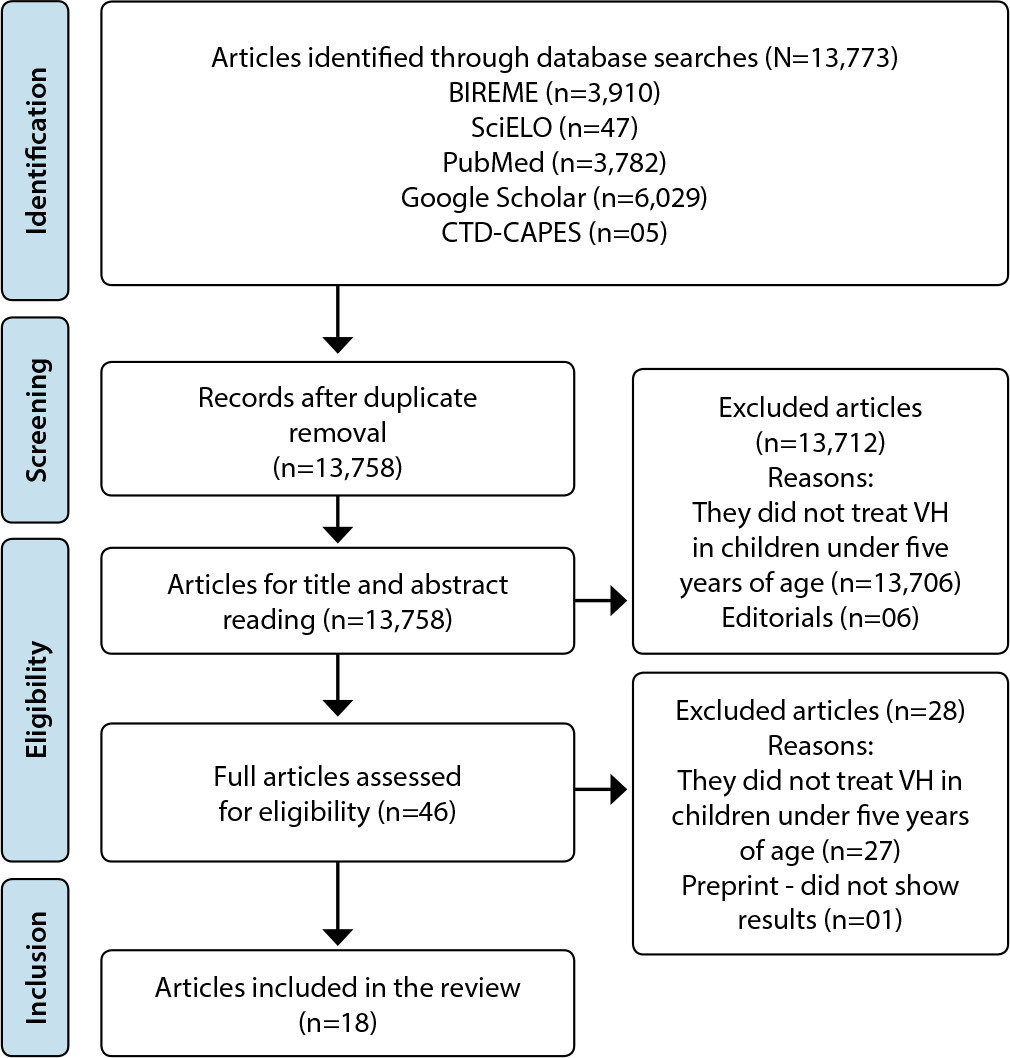
-
ORIGINAL ARTICLE11-27-2023
ICNP® terminological subset for people with diabetic foot ulcer in primary health care
Revista Brasileira de Enfermagem. 2023;76(5):e20220668
Abstract
ORIGINAL ARTICLEICNP® terminological subset for people with diabetic foot ulcer in primary health care
Revista Brasileira de Enfermagem. 2023;76(5):e20220668
DOI 10.1590/0034-7167-2022-0668
Views0See moreABSTRACT
Objectives:
to elaborate an ICNP® terminological subset for people with diabetic foot ulcers in Primary Health Care.
Methods:
this is a methodological study that followed five steps: 1) Identification of relevant terms for the patients through an integrative literature review and official documents in the area; 2) Mapping of terms identified with ICNP® terms; 3) Construction of statements of nursing diagnoses, outcomes and interventions; 4) Structuring of a terminological subset with the Self-Care Deficit Theory; and 5) Content validity of statements constructed with nurses from a programmatic area in Rio de Janeiro.
Results:
the subset developed is composed of 81 diagnoses/outcomes and 583 nursing interventions, organized into universal, change and development requirements.
Conclusions:
the subset on screen was predominantly composed of statements inserted in self-care requirements related to health changes, reinforcing the importance of quality of life and recovery.
-
01-01-2017
Assessing the adequacy of workload measurement tools using a quality-based methodology
Revista Brasileira de Enfermagem. 2017;70(1):39-46
Abstract
Assessing the adequacy of workload measurement tools using a quality-based methodology
Revista Brasileira de Enfermagem. 2017;70(1):39-46
DOI 10.1590/0034-7167-2016-0246
Views0See moreABSTRACT
Objective:
determine which tool (NEMS and NAS) is most suitable for use in intensive care units using a quality-based methodology.
Method:
after identifying the opportunity for improvement “Inadequacy of the NEMS for determining nursing workload in the intensive care unit (ICU)”, we assessed the NEMS and the NAS, as a proposed improvement to the NEMS, using quality improvement cycles methodology based on the following criteria: measurement of daily nursing workload on a daily and shift basis; the tool encompasses all nursing activities undertaken in the ICU; and workload assessed per patient and unit.
Results:
there was no significant difference in level of compliance for the NEMS (67%). The comparison NEMS-NAS showed that there was a statistically significant improvement for all criteria except criterion 1. The NEMS only assesses criterion 1 (64.22%); while the NAS assessed all four criteria, obtaining a compliance rate of 64.74% for criteria 1, 2, and 4, and 100% for criterion 3.
Conclusion:
the NAS is more suitable for measuring nursing workload in UCIs.
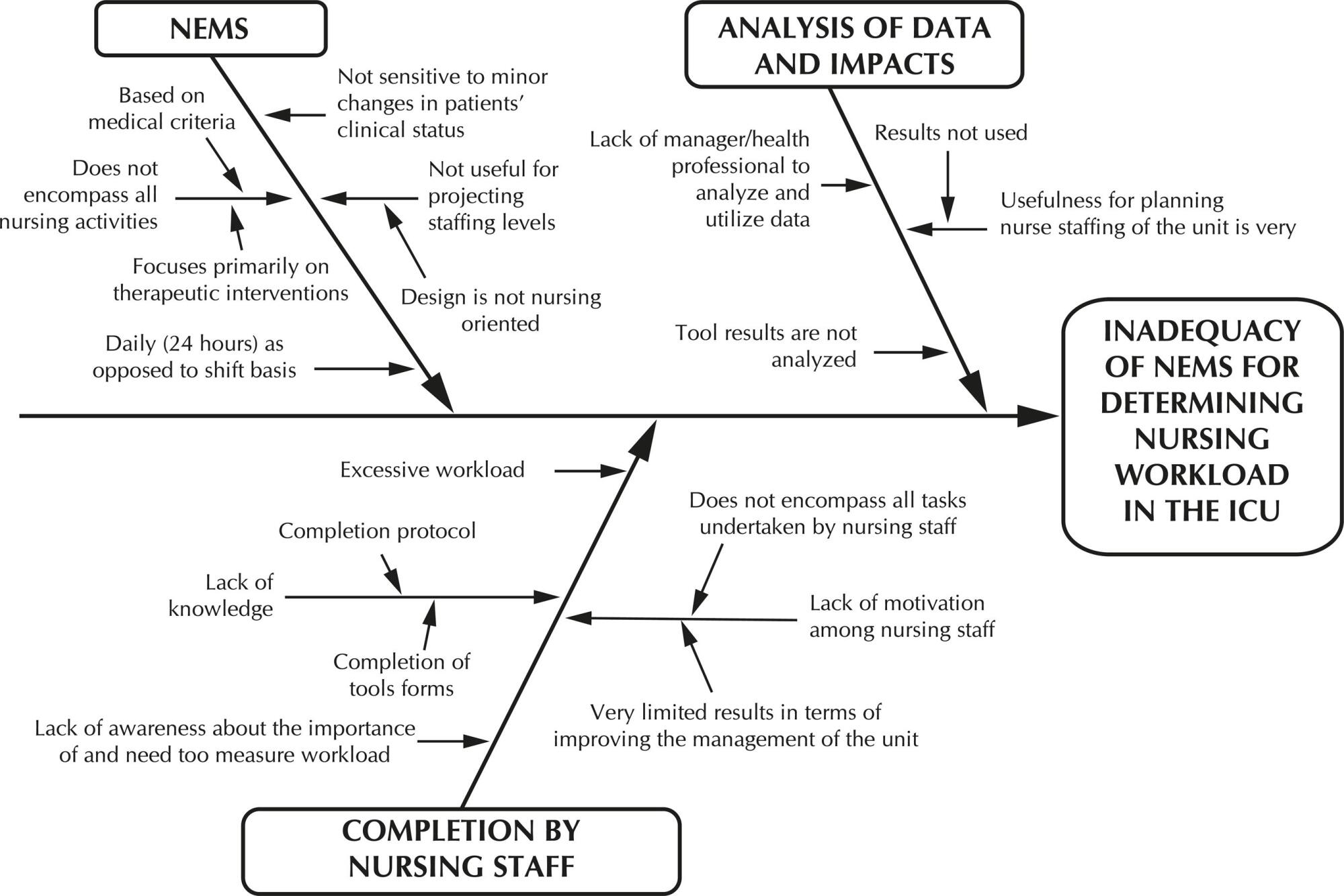
-
01-01-2017
Educational nursing intervention to reduce the hyperphosphatemia in patients on hemodialysis
Revista Brasileira de Enfermagem. 2017;70(1):31-38
Abstract
Educational nursing intervention to reduce the hyperphosphatemia in patients on hemodialysis
Revista Brasileira de Enfermagem. 2017;70(1):31-38
DOI 10.1590/0034-7167-2016-0015
Views0See moreABSTRACT
Objective:
to evaluate the effectiveness of an educational nursing intervention to reduce hyperphosphataemia in chronic renal patients on hemodialysis.
Method:
quasi-experimental study with 63 hyperphosphatemic patients on hemodialysis. The intervention consisted of developing and providing a printed and illustrated manual to patients containing information on disease control. The participant was asked to complete a daily checklist with the aim to reinforce aspects provided in the manual. Laboratory tests and itching intensity were analyzed at the beginning of the study, and at 30 and 60 days after the educational intervention.
Results:
the mean age of participants was 58±13.1 years, with a treatment time of 51.1±44.7 months. A reduction in serum phosphorus values of 7.06 ± 1.43 to 5.80 ± 1.53 (p <0.001) and the intensity of itching after the intervention was observed.
Conclusion:
the educational nursing intervention was effective in reducing phosphate and decreasing itching in hyperphosphatemic patients.
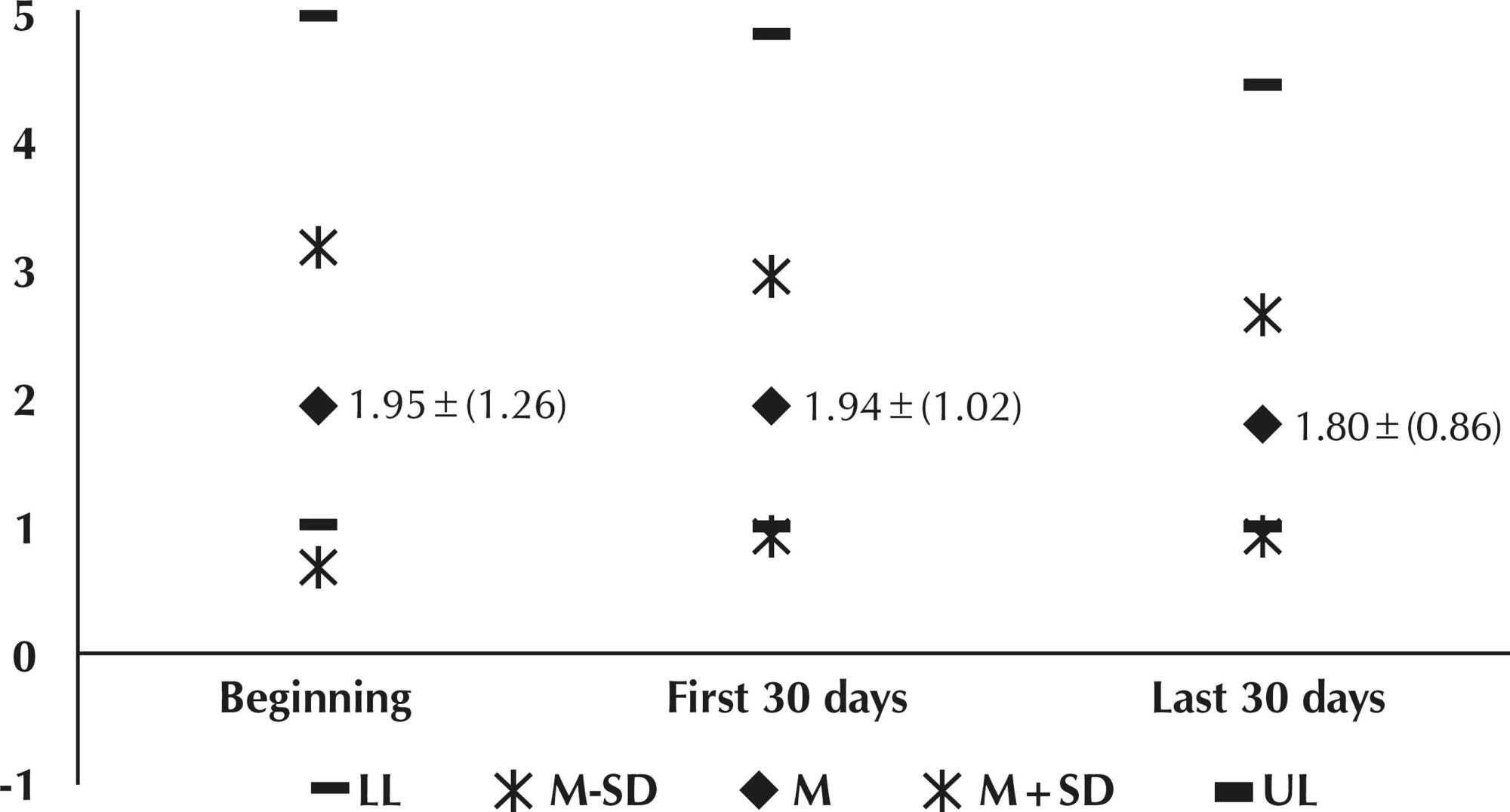
-
01-01-2017
Filial care and the relationship with the elderly in families of different nationalities
Revista Brasileira de Enfermagem. 2017;70(1):22-30
Abstract
Filial care and the relationship with the elderly in families of different nationalities
Revista Brasileira de Enfermagem. 2017;70(1):22-30
DOI 10.1590/0034-7167-2015-0050
Views0See moreABSTRACT
Objective:
identify how filial care and the relationship with the elderly occur in families of different nationalities.
Method:
qualitative study carried out in a town on the triple frontier of Paraná, comprising 33 elderly people of five different nationalities, adopting the Symbolic Interactionism and the Grounded Theory as theoretical-methodological strategy.
Results:
among Lebanese people, the Muslim religion teaches children to obey and respect parents; among French, distant family relationships and institutions for the elderly stand out. Paraguayans hold close family relationships; Chinese people consider filial care as a tacit obligation; Brazilians, in turn, tend to embrace and take care of their parents in old age.
Conclusion:
family care prevailed, but the traditions of each society lead the actions of that care, demanding health professionals’ capacity of recognizing in which context the elderly is inserted.
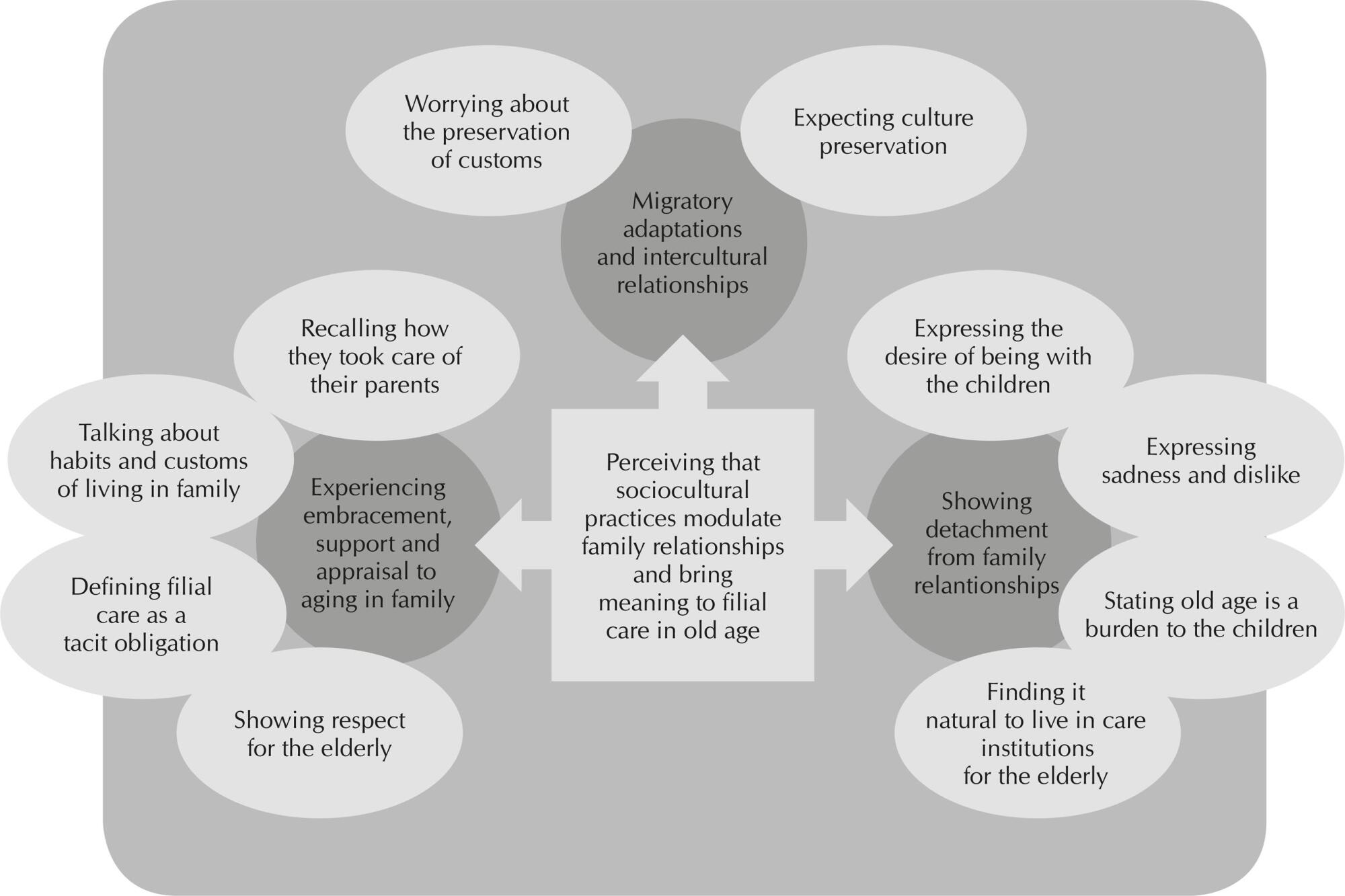
-
01-01-2017
Excesso de volume de líquidos: análise clínica e sociodemográfica em pacientes de hemodiálise
Revista Brasileira de Enfermagem. 2017;70(1):15-21
Abstract
Excesso de volume de líquidos: análise clínica e sociodemográfica em pacientes de hemodiálise
Revista Brasileira de Enfermagem. 2017;70(1):15-21
DOI 10.1590/0034-7167-2015-0138
Views0See moreRESUMEN
Objetivo:
analizar las características definitorias y los factores relacionados con el diagnóstico enfermero de exceso de volumen líquido y su relación con variables sociodemográficas y clínicas en pacientes de hemodiálisis.
Método:
estudio transversal, realizado mediante un formulario y examen físico, con una muestra de 100 pacientes, entre diciembre de 2012 y abril de 2013 en un hospital universitario y una clínica de diálisis.
Resultados:
se encontraron 10 asociaciones estadísticamente significativas entre las características definitorias, factores relacionados de volumen de exceso de líquido y las variables sociodemográficas y clínicas.
Conclusión:
las características definitorias y los factores relacionados de exceso de volumen líquido podrían estar influenciados por variables sociodemográficas y clínicas en clientes de hemodiálisis.
-
01-01-2017
Excess fluid volume: sociodemographic and clinical analysis in haemodialysis patients
Revista Brasileira de Enfermagem. 2017;70(1):15-21
Abstract
Excess fluid volume: sociodemographic and clinical analysis in haemodialysis patients
Revista Brasileira de Enfermagem. 2017;70(1):15-21
DOI 10.1590/0034-7167-2015-0138
Views0See moreABSTRACT
Objective:
To analyse the defining characteristics and related factors in the nursing diagnosis Excess fluid volume and its relationship to sociodemographic and clinical variables in haemodialysis patients.
Method:
Cross-sectional study, conducted using a form and physical examination, with a sample of 100 patients, between December 2012 and April 2013 at a university hospital and a dialysis clinic.
Results:
It was found 10 significant statistical associations between the defining characteristics/ related factors of Excess fluid volume and the sociodemographic and clinical variables.
Conclusion:
The defining characteristics and related factors of Excess fluid volume could be influenced by sociodemographic and clinical variables in haemodialysis clientele.
-
01-01-2017
Facing challenges in times of adversity
Revista Brasileira de Enfermagem. 2017;70(1):1-2
Abstract
Facing challenges in times of adversity
Revista Brasileira de Enfermagem. 2017;70(1):1-2
DOI 10.1590/0034-7167.2017700101
Views0At the confluence of tradition, respect for history and a critical approach to the issues inherent to the development of the nursing profession, the Brazilian Nursing Association (ABEn) has been consolidating an exemplary trajectory in Brazilian society. Throughout its history, the reflections, discussions and decisions on pertinent and urgent subjects of the profession have made […]See more -
01-01-2017
Enfrentando desafios em tempos de adversidades
Revista Brasileira de Enfermagem. 2017;70(1):1-2
Abstract
Enfrentando desafios em tempos de adversidades
Revista Brasileira de Enfermagem. 2017;70(1):1-2
DOI 10.1590/0034-7167.2017700101
Views0Na confluência da tradição, do respeito pela história e da abordagem crítica das questões inerentes ao desenvolvimento da profissão de enfermagem, a Associação Brasileira de Enfermagem (ABEn) vem consolidando uma trajetória exemplar na sociedade brasileira. Ao longo da sua história, as reflexões, discussões e decisões sobre assuntos pertinentes e prementes da profissão têm possibilitado intervenções […]See more -
01-01-2016
Epistemology of nursing care: a reflection on its foundations
Revista Brasileira de Enfermagem. 2016;69(6):1240-1245
Abstract
Epistemology of nursing care: a reflection on its foundations
Revista Brasileira de Enfermagem. 2016;69(6):1240-1245
DOI 10.1590/0034-7167-2016-0331
Views0See moreABSTRACT
Objective:
to reflect on nursing care and its epistemology from its historical, theoretical, philosophical, spiritual dimensions and as a social practice.
Method:
discussions originated in the discipline “Epistemology of caring”, from the graduate nursing program of the School of Nursing, Federal University of Minas Gerais, and in critical analysis of nursing literature together with the professional practice of the authors.
Results:
we identified the necessity of developing a critical conscience on health care provision, research, and teaching, as well as on challenges in maintaining high standards of working interpersonal relationships, which has a profound impact on population health.
Conclusion:
we suggest the rescue of integrality, humanization, unity, and spirituality in researches and practices of individual, familiar, and community care, as an advance in incorporating epistemology of caring in nursing.
Search
Search in:
Nuvem de Tags
Adolescente (85) Atenção Primária à Saúde (239) COVID-19 (91) Criança (91) Cuidados de Enfermagem (269) Educação em Enfermagem (151) Educação em Saúde (139) Enfermagem (930) Enfermagem Pediátrica (86) Estudantes de Enfermagem (77) Estudos de Validação (131) Família (87) Idoso (208) Promoção da Saúde (99) Qualidade de Vida (104) Saúde do Trabalhador (86) Saúde Mental (145) Saúde Pública (82) Segurança do Paciente (150) Tecnologia Educacional (100)



